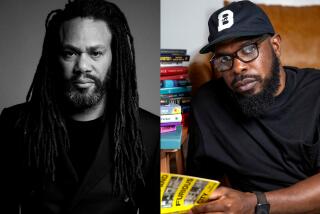Idiosyncratic book series mixes things up
- Share via
One is a two-fisted, horse-stealing Australian outlaw. Another is a rakish, wise-cracking hermaphrodite; yet another is an intuitive 15-year-old girl coming of age in late-summer East Hampton.
It’s hard to find any common ground among the protagonists who will come to UCLA over the next few months as their authors read from their works. They’re united only by appealing to Mona Simpson, the author and UCLA professor who is behind the new series “Our Favorite Writers: A Series of Readings and Shop Talk.”
The series kicks off Monday with Jeffrey Eugenides, author of “The Virgin Suicides” and last year’s Pulitzer Prize-winning “Middlesex,” and continues with Alice McDermott (“Charming Billy,” “Child of My Heart”), the Aussie novelist Peter Carey (“True History of the Kelly Gang”) and memoirist/short-story writer Tobias Wolff (“This Boy’s Life,” “The Night in Question”). The season closes next spring with acid-tongued English novelist Martin Amis in conversation with contrarian journalist Christopher Hitchens.
They’re some of the most celebrated authors of our day. But Simpson, 46, the petite and personable author of “Anywhere But Here” and “Off Keck Road,” says she’s hoping for “not a huge series, but an idiosyncratic series.” One of her priorities, she says, is to draw students. “You want the university to be a kind of hub for the community,” Simpson says from her office in Santa Monica, “with students and much older people coming together around passionate interests. I think you can do that with writers and readers.” Her series appears as part of the UCLA Live 2003-2004 season, which also includes appearances by Salman Rushdie, Tony Kushner, Chris Ware, Alice Sebold and others.
Curated by the UCLA English Department and the Atlantic Monthly magazine, “Our Favorite Writers” also becomes, in its first season, one of Southern California’s leading literary programs, a rival to the strongest offerings in town such as the Writers Bloc series and the readings at the Los Angeles Central Library.
Simpson says she plans to include a mix of authors, both those who have new works to promote and those who don’t. She hopes to get Jonathan Franzen, David Foster Wallace and Alice Munro next season whether they have new books out or not, she says.
The series, says Benjamin Schwarz, an Atlantic Monthly editor who will move the magazine’s literary operations to Los Angeles this fall, “will be modeled after the Paris Review ‘Writers at Work’ interviews. The kind of workaday questions, and intricate questions, a writer would ask another writer are very different from what a critic would ask, or an academic.”
Simpson says the format she plans will have each guest reading a substantial number of pages, then discussing craft with her, then taking audience questions.
While this inaugural season concentrates on established writers at the top of the critical heap, Simpson hopes to break new or underappreciated writers as well. “It would be great to have a strong subscription series like [New York’s] 92nd Street Y, and bring a writer who nobody has ever heard of, a great writer who’s underappreciated,” says Simpson. “To have a subscription base that basically trusted our judgment.” She’s also interested in giving writers a chance to appear with their publishers or editors. “I think a lot of writers here feel very far from the publishing world,” she says.
Schwarz helped line up the biggest of the series’ events, the conversation between Amis and Hitchens. Last year Amis wrote a curious, sometimes scorching book assailing intellectuals in general and Hitchens by name, for their defense of Joseph Stalin’s atrocities. (Neither writer, reportedly, has any interest in going back over this ground at their April 20 UCLA appearance.)
Amis has a new novel, “Yellow Dog,” which has been both praised and damned in Britain. Whatever its reception here, crowds are big whenever he appears. This kind of pro-wrestling-size literary blowout will remain the exception. Still, the UCLA series could become a kind of literary Goliath, making it more difficult for other series to compete for writers. But Andrea Grossman, who runs the similarly organized Writers Bloc series without the institutional support that the magazine and the university offer Simpson, welcomes the increased activity.
“When you look at the tour schedules for authors, you see that L.A. is often omitted,” Grossman says. “So it’s better for all of us to have more series like this. Maybe the publishers will lift their heads out of the sand and see that there’s a place under San Francisco that’s a lot more productive.”
More to Read
Sign up for our Book Club newsletter
Get the latest news, events and more from the Los Angeles Times Book Club, and help us get L.A. reading and talking.
You may occasionally receive promotional content from the Los Angeles Times.










